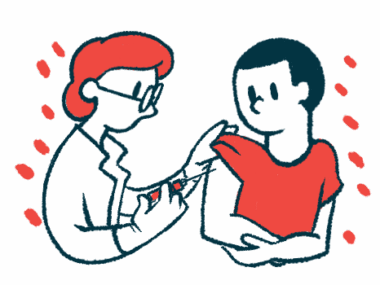Sharing Duties as a Family Caregiver Is Like Losing a Security Blanket
When you've been in charge for so long, it's hard to adapt to change
Written by |

“As a simple demonstration/ Of my independent station/ I will go and leave my blanket on the floor.” This is one of my favorite sets of lines sung by Linus in “My Blanket and Me,” from one of my favorite musicals, “You’re a Good Man, Charlie Brown.”
In the musical, based on Charles Schulz’s famous comic strip “Peanuts,” Linus engages in a loving song-and-dance tribute to his beloved blanket. However, after being brutally teased by his older sister, Lucy, he seeks to prove that he can leave his blanket on the floor and walk away. Before he makes it 10 feet, he rushes back to his blanket, apologizes for leaving it, and is slightly disappointed that he can’t live without it.
Linus’ co-dependent relationship with his blanket is legendary, especially in the comic strip. Avid fans of the daily drawings were sometimes treated to the young boy’s meltdowns when someone separated him from his precious possession.
As an adult, the Linus-blanket relationship seems ridiculous. Ironically, he’s portrayed as a prodigy in the musical and the comic strip. An intelligent person should be able to let go of something that isn’t necessary to help him survive. However, because he’s had it for so long, he’s unsure how to navigate his life without it.
Is caregiving my blanket?
“I got it, baby,” my husband, PJ, assured me as he grabbed his hospital bag last week. Our oldest daughter, whom we fondly call Ladybug, was in the middle of another flare due to her hereditary angioedema (HAE). Although I’d administered her emergency infusion at home, she needed another dose, making a trip to the emergency room necessary.
My husband is a remarkable caregiver. He knows how to talk to ER doctors and advocate for Ladybug if she has a hospital stay. Yet as I watched them pull off in the SUV, I had what felt like empty energy. I was anxious because I wasn’t going.
And why wasn’t I going? We knew Ladybug would have to stay the night, and I had four classes to teach the next morning. My husband, however, who coincidentally had the next day off, could drop everything to take her.
But this wasn’t the first time since this school year started that he’s stepped in. PJ has taken Ladybug to checkups and allergy shots, spoken with the specialty pharmacy on her behalf, and called doctors’ offices to make new appointments. As a result, I’m briefed by my husband as he catches me up on new medical information.
“You seem unsettled,” he said as I cleaned up and organized a space in our house. I had to do something with my excess energy. I was buying time before returning to campus to teach my next class, and if something went wrong, the school would know to call him instead of me.
“I don’t know what to do when I’m not solely responsible for all of her medical stuff,” I finally admitted.
Even though she was diagnosed in 2021, I’ve taken Ladybug to her appointments since she was 4 years old. I’ve memorized her medical history, administered her meds, stayed up with her during bad nights, and become her “roommate” during hospital stays. The act of caregiving became my security blanket, and the title became my identity.
But now, as a college professor, I’ve found that sharing this heavy load of caregiving with my husband, which would seem ideal to some, has made me question who I am now.
They don’t explain this feeling about caregiving, when circumstances change or responsibilities shift. The longer you act as a caregiver, especially for a growing child, the harder it is to walk away from the “security” of that role. Even with the unpredictability of HAE, knowing that I was facing it every day made it somewhat reliable in an unpredictable world. I had to admit that I’m comfortable with the assurance of uncertainty.
I’m learning to embrace who I am outside of being a caregiver. Yes, it’s an important role, but it’s OK if it’s shared, if I’m helped, and if my husband carries the torch for a while.
November is National Family Caregivers Month. To all my fellow caregivers, take time to find out who you are outside of what you do. We’re stronger when we first take care of ourselves before we take care of others.
Note: Angioedema News is strictly a news and information website about the disease. It does not provide medical advice, diagnosis, or treatment. This content is not intended to be a substitute for professional medical advice, diagnosis, or treatment. Always seek the advice of your physician or other qualified health provider with any questions you may have regarding a medical condition. Never disregard professional medical advice or delay in seeking it because of something you have read on this website. The opinions expressed in this column are not those of Angioedema News or its parent company, Bionews, and are intended to spark discussion about issues pertaining to angioedema.




Leigh
Sharing caregiving duties can be so hard, even when all you want to do is take a break. It truly does feel like it becomes part of your identity after a while. Thanks for sharing this perspective. I feel like we don't hear it enough. Also, for anyone interested, I found this article particularly helpful when I found myself struggling to offload some of my caregiving duties. https://oregonadvantagehomecare.com/practical-ways-to-share-caregiving-duties/